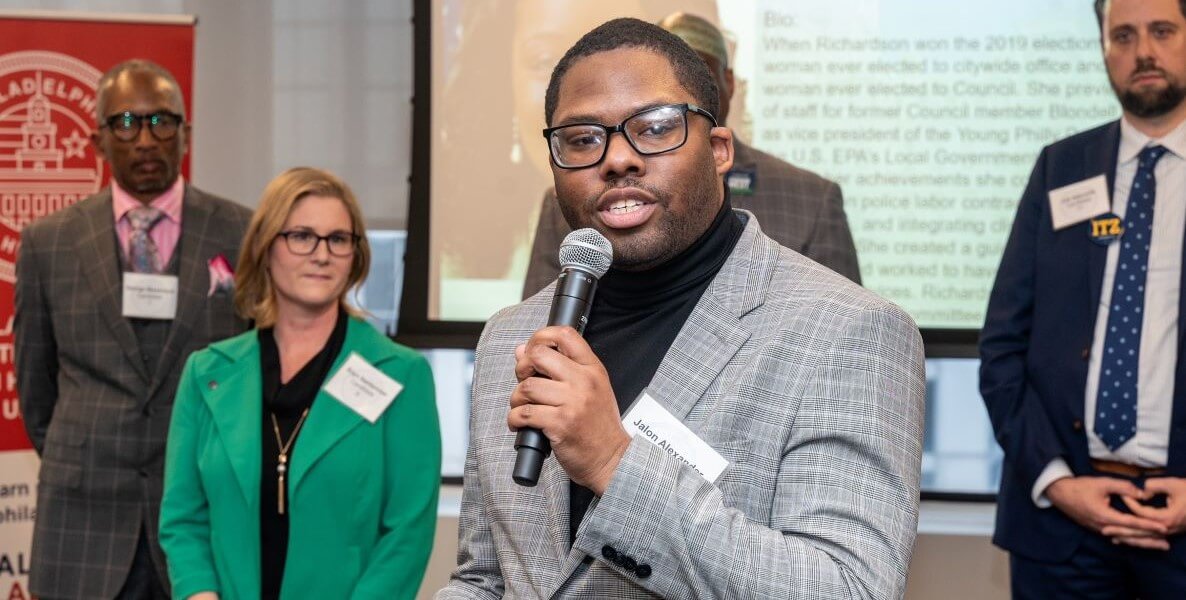As a child, Jalon Alexander walked door-to-door with his great-grandmother through North Philadelphia‘s Strawberry Mansion neighborhood, distributing election literature to neighbors and recognizing the inequity of poverty, poor city services and violence. That experience, he says, inspired him to want to be a public servant.
Today, as a candidate for City Council at-large, Alexander sees those same issues persist, and wants to tackle them with a fresh perspective and governing style that he promises will be innovative and transparent.
Among the 30-year-old’s proposed innovations: Drone Force Philly, a $3 million program that would deploy small flying cameras throughout the city to respond to crime. Alexander points to other cities, including Beverly Hills, California, as models for using drones to fight crime, noting that they are relatively inexpensive, and can identify vehicles and follow fleeing suspects without endangering the public.
“People say tech is the way of the future, but tech is the way of the present,” says Jalon Alexander.
“Tech can do certain things that people can’t,” Alexander says. “Drones give support, collect evidence we couldn’t without them — even get to the scene before police, so units are better equipped to intercept and make arrests.”
Alexander also points out that drones “see crime, not color,” and that, when combined with cognitive bias training for police, can help reduce bias in law enforcement, while increasing effectiveness. Alexander’s plan would add 42 drones and a 10-person staff to handle IT, monitor the drones, and coordinate with police response. Theoretically, if each police district deployed a single drone at the same time, together, they could patrol all 147 square feet of Philadelphia.
The idea of a police drone fleet is not without controversy; activists around the country have objections that center around both privacy and the potential use of AI-powered facial identification technology, which has demonstrated racial bias. Alexander, though, rejects this criticism, insisting that as software is developed by a more diverse tech workforce, these biases will be weeded out.
He cites the recent request from the DA’s office for the public’s help locating 10 wanted individuals that law enforcement couldn’t find as a prime example of the opportunity technology presents to law enforcement. “People say tech is the way of the future, but tech is the way of the present. We have to do a better job of investing in that,” he says. “The priority has to be stopping crime and gun violence.”
Political ambitions, lived experience
Drone policing is just the most well-known piece of Alexander’s platform, which also includes a plan to increase school funding and grow well-paying tech jobs — both issues that stem from his own impressive background.
In addition to his great-grandmother’s social responsibility, it was his mother’s determination and grit as a single mom he emulated when he was accepted to historic Bodine High School for International Affairs. He attended Penn State for his BA in political science and government, where he became the first African American student body President of the Commonwealth Campuses Student Government. After the Jerry Sandusky scandal broke, he fought funding cuts to the university proposed by the state legislature. He got his first experience in city government while still a student, serving for two years as a policy intern at the Philadelphia City Controller’s Office.
At just 21, an unsuccessful run for Philadelphia Committeeperson steered Alexander into law school. At the University of Pittsburgh, Alexander earned his law degree and a Master’s in international relations and affairs. He also was a volunteer board member of Pittsburgh public broadcasting stations WYEP/WESA and worked pro bono on behalf of underserved and senior community members to draft wills and protect the rights of individuals and children with disabilities through Disability Rights PA.
“Anytime in politics when you can have one foot in the old and one foot in the new, that’s a good thing,” says Larry Ceisler.
Alexander studied cybersecurity and worked with Buchanan Ingersoll & Rooney PC while earning his degree. He’d go on to join Makpar Corp. as a cybersecurity attorney. He is a champion of the tech industry’s potential benefits for both public safety and economic security, if only it’s implemented correctly.
Larry Ceisler, founder of Ceisler Media & Issue Advocacy, was an associate of Alexander’s grandfather, Maurice Floyd, who served as a ward leader and Philadelphia City Commissioner. Ceisler has known Alexander since he was in high school, and his list of adjectives describing the candidate includes smart, kind, determined, and, multiple times, innovative. “I’ve always been impressed with him,” he says. “He’s innovative; he looks for something different, you know? He’s the type of guy who solicits people’s opinions. He’s a listener, and you know, in politics, unfortunately, we have too many talkers. And we don’t have enough listeners.”
Another unique aspect to Alexander’s “lived experience,” Ceisler points out, is that he’s a mix of old connections and new ideas. “The thing about Jalon is he’s sort of a mix of the old and new because of his grandfather, who was a ward leader and an elected official, who’s well-liked. But Jalon’s not that machine-type person, he’s had good mentors when it comes to politics, so that’s the old. Then the newer things are the drones and his other ideas. Look, I think anytime in politics when you can have one foot in the old and one foot in the new, that’s a good thing.”
Jalon Alexander’s platform
If Alexander’s experiences — in higher ed, law, and cybersecurity — taught him anything, it’s two things: Most Philadelphians are unprepared for the technological future ahead. And, it’s incredibly difficult for people of color to break into tech. He believes he’s come up with an approach that can help solve crime in Philly — while better educating our kids, and finding them stable, well-paying, forward-looking jobs.
Start tech early
Alexander proposes working with the city’s Board of Education to reform the curriculum and prepare students for future careers in technology with more STEM classes, financial education, and trade programs. Like other candidates, he wants to help build partnerships — among nonprofits, universities, and non-special admission public schools — to provide better opportunities for students even in the poorest neighborhoods.
He says he knows Philly’s schools can’t improve unless they are all properly funded, regardless of zip code. His plan to address this is three-pronged: Work to change the way the City taxes property in order to change the way the state’s school funding formula works; extend public education; and grow the tax base with good jobs.
A recent court ruling declared the current public school funding scheme in Pennsylvania unconstitutional for depriving students in poorer communities of the education they’re entitled to by the state. Alexander sees this as a “golden opportunity” for Council to work with Harrisburg and the School District on what his campaign calls “innovative solutions” to public school funding. In particular, Alexander wants to look at how the City assesses and taxes property to ensure it is equitable, while at the same time restructuring public school funding at the state level and equipping Philadelphians with the training for high-paying jobs that will, in turn, grow the tax base.
Expand jobs in tech
Philadelphia is a growing tech hub, thanks to a combination of City government initiatives, support from higher education, and location-based advantages. “Philadelphia,” Alexander says, “has more technology opportunities than seats in Lincoln Financial Field.”
Accessing them requires specific training, starting in school. Alexander’s job growth plans include working hand-in-hand with businesses and Philly colleges and universities. He also wants to subsidize STEM certification programs and vocational programs for adults, especially for those without college degrees. He believes the demand for tech jobs will create higher income for current low-wage earners (and therefore a stronger tax base for the city). It’s just a matter of education and training.
A tech-savvy solution to crime
Alexander believes reducing gun violence requires a multi-faceted approach, including increased investment in violence prevention programs and community policing. Technology is key to Alexander’s platform, even beyond drones. “We have to police like it’s 2023, not like it’s 1983,” he states. He wants to implement public access to surveillance cameras to help encourage greater community response and tips, and to help the City use data to identify where, when, and how to deploy officers and resources efficiently.
Getting this right is crucial, Alexander says, for what he says is an obvious reason: “Policing effectively creates opportunities for Philadelphians,” he says. “We must make Philadelphians safe, or we won’t reach our potential.”
The Citizen is writing about Philadelphia City Council candidates who are doing what for a long time was the unthinkable: Bucking the system by running for office with ideas and experience — not just by dint of being the usual suspects. Because if there’s one thing we need more of, it’s this: More people paying more attention to our local politics, running for office, offering solutions and prepping to bring about much-needed change.
 Lead support for Every Voice, Every Vote is provided by the William Penn Foundation, with additional funding from The Lenfest Institute, Peter and Judy Leone, the John S. and James L. Knight Foundation, Harriet and Larry Weiss, and the Wyncote Foundation, among others.
Lead support for Every Voice, Every Vote is provided by the William Penn Foundation, with additional funding from The Lenfest Institute, Peter and Judy Leone, the John S. and James L. Knight Foundation, Harriet and Larry Weiss, and the Wyncote Foundation, among others.
![]()
MORE ON CITY COUNCIL ELECTIONS FROM THE CITIZEN



